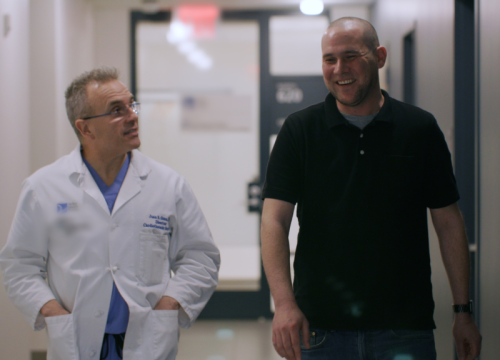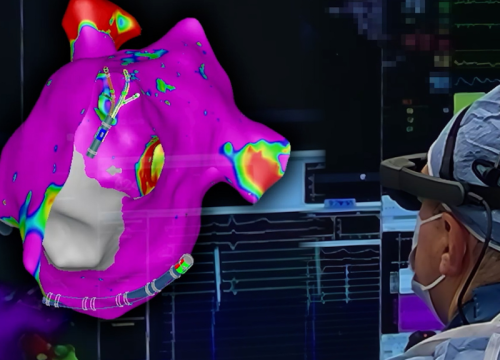Anemia is a common and treatable medical condition. There are many types of anemia, and because each requires its own treatment, it is important to get an accurate diagnosis. At Valley’s Center for Blood Disorders, our hematology team specializes in diagnosing and treating blood disorders, including anemia.
What is Anemia?
Anemia is the most common benign (noncancerous) blood disorder. It is a condition in which there are not enough healthy red blood cells in the blood. Your red blood cells are the cells that carry oxygen throughout your body. In anemia, your body either does not have enough red blood cells or your red blood cells do not work properly. As a result, your organs do not get enough oxygen.
What Causes Anemia?
Anyone can develop anemia, but certain factors increase your risk:
- Your diet lacks certain vitamins and minerals like iron, vitamin B12 or folic acid
- You have an inherited condition that changes the size, shape or function of your red blood cells
- You have a medical condition, such as lupus or cancer, that slows red blood cell production
- You are pregnant
- You have abnormally heavy menstrual periods
- You have internal bleeding
Types of Anemia
There are many types of anemia, each with its own cause. They include (but are not limited to):
- Iron-deficiency anemia: As the name implies, this type of anemia occurs when your iron levels are too low. Your body needs iron to make hemoglobin, the substance that allows red blood cells to carry oxygen.
- Anemia of inflammation or chronic disease: This is a type of anemia that occurs in people who have conditions that cause inflammation such as infections, autoimmune diseases, cancer, and chronic kidney disease.
- Pernicious anemia: If you have pernicious anemia, your body is unable to absorb vitamin B12 — a nutrient that helps create new red blood cells.
- Sickle cell anemia: With this inherited condition, your body produces sticky, abnormally shaped red blood cells. These cells make it harder for blood to flow through your body.
- Hemolytic anemia: This type occurs when your red blood cells break down or die too quickly, and your body can’t replace them fast enough.
- Aplastic anemia: With this rare type of anemia, your body does not produce enough red blood cells.
Other common forms of anemia are associated with chronic illness, such as renal disease and chronic inflammation. Some anemias are easily treatable. Others require long-term or even lifelong care.
Anemia Symptoms
Anemia symptoms vary from person to person and not everyone who is anemic has symptoms. However, most people — regardless of the type of anemia they have — feel fatigue and a loss of energy.
Other common symptoms include:
- Dizziness or lightheadedness
- Fast or irregular heartbeat
- Headache
- Paler-than-normal skin
- Shortness of breath
Anemia Diagnosis at Valley
Anemia symptoms, including fatigue and shortness of breath, can be caused by many medical conditions. It is important to seek care from providers who will take the time to figure out why you don’t feel well.
At Valley, our dedicated team of hematologists and nurse practitioners specialize in diagnosing and treating blood disorders, including anemia. With expertise and precision, we work to determine what your symptoms are and whether they are linked to anemia or another underlying condition. Since anemia often shares symptoms with other health issues, our specialists focus on delivering an accurate diagnosis and treatment.
Your Personal and Medical History
Here at Valley, our hematologists will listen carefully to your concerns — and ask questions that help them uncover what’s going on. For example:
- We want to understand how long you have had your symptoms and how they have affected you.
- We want to learn about your lifestyle.
- We want to find out whether you or anyone in your family has had certain medical conditions that can cause anemia.
Tests for Anemia
Your answers to the questions above are like pieces of a puzzle. To solve the puzzle, we may order additional blood tests to provide these answers.
These tests, which can help us diagnose anemia while ruling out other conditions, typically include:
- Complete blood count (CBC): This test measures and analyzes many different components of your blood, including the number of red blood cells you have.
- Peripheral blood smear: This test examines your blood cells under a microscope so we can assess their size and shape.
- Iron studies: This test helps determine how your body processes iron.
- Vitamin test: This test checks for vitamin B12 or folic acid deficiencies.
- Bone marrow tests: This test analyzes your bone marrow to assess red blood cell production.
- Other specialized tests: Because there are many rare causes of anemia, we may also order specialized tests depending on your medical history and the results of the tests above.
We use this information to confirm what type of anemia you have and create a customized treatment plan.
Anemia Treatment at Valley
Depending on the type of anemia you have, your treatment plan may include one or more of the following:
- Lifestyle changes: You can improve (or help prevent) anemia by eating foods rich in iron, vitamin B12 and folic acid. Quitting smoking and limiting alcohol intake also lowers the risk of anemia.
- Dietary supplements: If a vitamin or mineral deficiency caused your anemia, taking supplements, such as oral iron supplements can help get your red blood cell levels back to normal.
- Medication: Some oral and injectable medicines help your body create more red blood cells. Others stop your immune system from attacking your red blood cells or bone marrow (the material inside your bones where blood cells are made).
- Blood transfusion: For some people with anemia, periodic blood transfusions with donor blood help raise red blood cell counts.
- Stem cell transplant (bone marrow transplant): Normally, stem cells in your bone marrow produce all the blood cells you need. But if you have a condition that damages your stem cells or bone marrow, you may need a stem cell transplant. With this procedure (also known as a bone marrow transplant), you receive healthy stem cells from a suitable donor. These donor cells travel to your bone marrow and begin producing new blood cells. Valley will refer you to a bone marrow transplant program.
If your anemia is caused by another medical condition, such as lupus, we will work closely with any other providers involved in your care. In the case of anemia during pregnancy, we will work closely with your obstetrician (OB/GYN). Our hematology team and other specialists will work together to treat the root cause of your condition and work to restore your red blood cell count to optimal levels.
Why Choose Valley for Anemia Care?
Expert care, close to home: We offer the same depth of expertise — and the same breadth of services — as larger medical centers. This means you can get the anemia care you need right here in your own community.
Treatments tailored to you: If you have a choice in your anemia treatments, your Valley hematologist will help you find the best fit. Our goal is to help you make decisions based on both your medical needs and your personal preferences.
Evidence-based, data-driven care: We stay up to date with new research findings and follow national guidelines related to anemia and other blood disorders. In other words, we offer well-studied treatments that are proven safe and effective. And our patients have access to the most promising new treatments — including the first-ever targeted therapy for sickle cell anemia.
A partnership with Mount Sinai: Valley has partnered with the Mount Sinai Health System to provide stem cell transplants to our patients who need them. Nurse navigators from both Valley and Mount Sinai make this process run seamlessly.
Our hematology team offers the medical expertise you need — and the guidance and support you deserve. When you turn to us for anemia care, you will be treated with warmth and respect. We take the time to listen to your concerns and make sure you understand your diagnosis and treatment options.
















